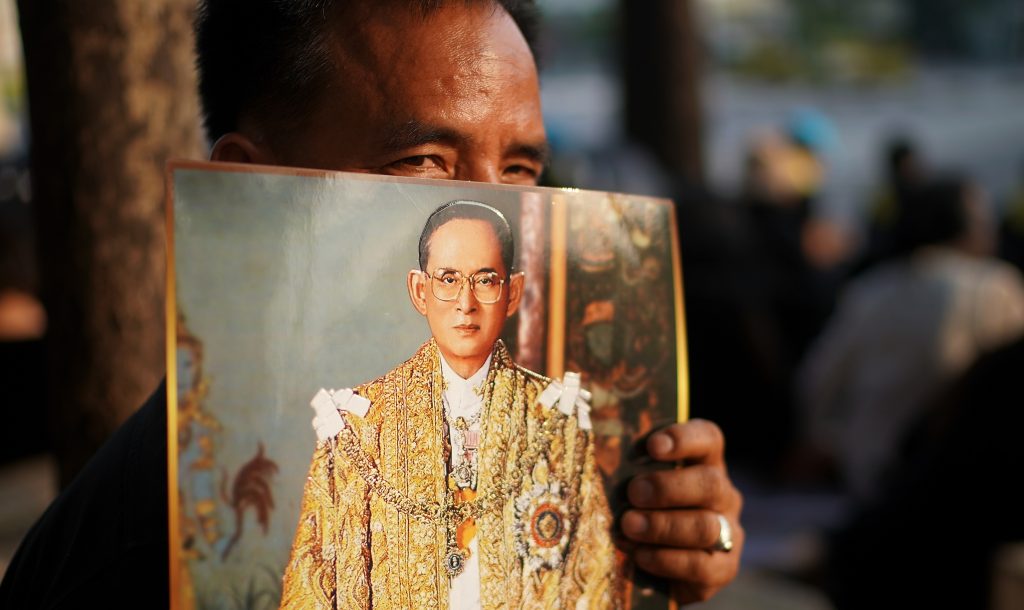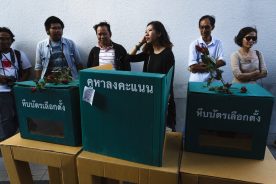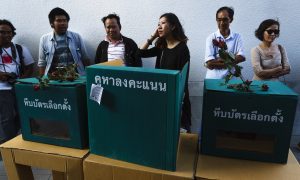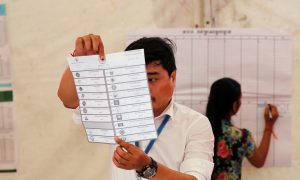Thailand’s 2019 general elections will be the first since the passing of the late King Bhumibol Adulyadej, or Rama IX, on 13 October 2016. Concomitantly, they will be the first elections in Thailand not held under political conditions of royal hegemony and the Bhumibol consensus since 14 October 1973, when the late king intervened in support of students and civilians protesting against the dictatorship of Field Marshal Thanom Kittikachorn. October 1973 crystallised Bhumibol’s popularity and his quasi-divine status as the protector of the people, culminating the reinvigoration of the monarchy’s presence in public life that was promoted under the rule of Field Marshal Sarit Thanarat throughout the 1960s.
Under Bhumibol’s populist-guided democratic reign, Thailand saw 40 long years of royal hegemony (here, hegemony is used to mean leadership by consent and non-coercive compliance a la Antonio Gramsci). The effect was to bind the development of Thailand’s democratic system and the monarchical institution in, as described since the 1978 constitution, “a democratic regime of government with the king as head of state” (ระบอบประชาธิปไตยอันมีพระมหากษัตริย์ทรงเป็นประมุข). Under such a regime, the reforms that can be initiated via democratic process, particularly the potential for fundamental, radical change, are reined in and hinge on the approval and initiative of the monarchy. Under conditions of royal hegemony, political, economic and cultural change was tempered by the following characteristics of governance: (1) Governance primarily involved participation by and benefited elites, rather than common people. (2) The distribution of power and benefits was hierarchical-cum-clientelist, rather than egalitarian. (3) Rather than democratic, governance became authoritarian with a moralistic and technocratic inclination. Expressed in the terms of those who espouse it, that authoritarian governance represented “Thai-style modernity”—a conservative, cautious approach to reform.
Yet the inevitably corporeal and impermanent agency of monarchy meant that not even royal hegemony could endure forever. This inevitability was not lost on the monarchical network, which prepared for the post-Bhumibol scenario as early as the politically reformative constitution of 1997. In place of Bhumibol’s charisma, the institution of the Constitutional Court was established to function as a surrogate king, whose supreme judicial authority under the constitution was supposed to maintain the legitimacy of the democratic regime of government with the king as head of state.
What nobody predicted were the cumulative effects of the Tom Yum Goong Asian Financial Crisis of 1997 and the 1997 Constitution. The intent of the constitution was to “close off corruption, open up efficiency, and strengthen leadership”, especially the authority of those in peak governance positions—the prime minister and leaders of large political parties. The method to do so was a party-list, proportional representation electoral system under which the entire country was a single constituency for 100 seats in the House of Representatives (the remaining 400 were elected through a first-past-the-post system in single-member constituencies). The result was the rise to power of Police Lieutenant Colonel Thaksin Shinawatra and his pluto-populism.
Politically, the Thaksin regime represented a wholesale recalibration of electoral competition and structures of political power. Provincial-boss dominated, clientelistic politics evolved into party-dominated, policy-based politics led by a populist leader. Economically, the Thaksin regime overturned a system of distributing benefits amongst various elite factions based on competitive clientelism, whereby political leaders in mutually-beneficial arrangements with prominent capitalists competed in rent-seeking. In its place, a system of monopolistic clientelism emerged. Thaksin and those close to him in Thai Rak Thai monopolised political power, and the privileged economic connections and control over rent that came with it. It may be said now that the democratic regime of government with the king as head of state was not designed to support the co-existence of two populist leaders. One came into being by royal birthright and the other through democratic elections, but both claimed to speak in the name of the nation. In the end, one had to give way unceremoniously to the other.
It is worth mentioning that the coup on 19 September 2006, which took place a month before general elections were scheduled, was led by a junta that deliberately called itself, if translated literally, the Council for Administrative Reform Under a Democratic Regime of Government with the King as Head of State (the junta later clarified its English name to be the Council for Democratic Reform, before changing this to the Council for National Security). The significance of the name lies in its hinting that the Council desired political and administrative reform of some kind. Such reform was not, however, to involve fundamental regime change but rather was to be enacted under the framework of the democratic regime of government with the king as head of state. Revealingly, this indicated that balance between the two central components of the regime—the democratic system and the monarchical institution—had been lost under Thaksin’s government, to the point that electoral results had become a threat to royal hegemony. Reform would be necessary to tame the democratic system.
In this context, the ambitions of the Council for National Security (CNS) were always to bring about a return to the political and economic arrangements that existed under royal hegemony before the rise of Thaksin. This same goal was shared by the so-called “judicial review” activism spearheaded by the Constitution Court in the aftermath of the April 2006 elections, whereby, among other interventions, the Court annulled the electoral victory of Thaksin’s Thai Rak Thai party and dissolved the party in 2007. A return to royal hegemony was also desired by royal-nationalistic movements, whether it be the People’s Alliance for Democracy (PAD) from 2005–09 or the People’s Democratic Reform Committee (PDRC) from 2013–14.
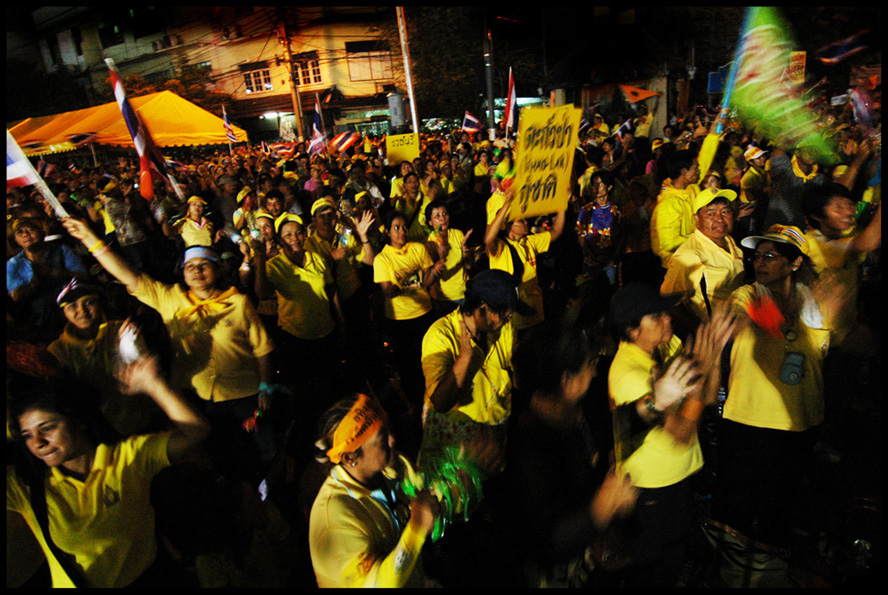
PAD protest, 2008 (Photo: Adaptor-Plug on Flickr, Creative Commons)
Against this background of unravelling royal hegemony, what are we to make of the political turmoil of the past 12 years (2006–18)? During that period, Thailand has seen 8 prime ministers (including 2 who have been acting prime ministers) and 2 coups: by the CNS on 19 September 2006 and by the National Council for Peace and Order (NCPO) on 22 May 2014. Mass movements in opposition to alternating governments-in-office have come in 7 waves, led by: the PAD in 2006, the Democratic Alliance Against Dictatorship (DAAD) in 2007; the PAD in 2008; the United Front for Democracy Against Dictatorship (UDD) in 2009; the UDD in 2010; the Pitak Siam Group in 2012; and the PDRC from 2013–14. Crackdowns on protest on 4 occasions (2008, 2009, 2010 and 2013–14) cumulatively led to the deaths of hundreds, the injuring of thousands, and several hundred billions of Baht in economic loss. Last but far from least, the country has seen four constitutions (an interim constitution in 2006, a new constitution in 2007, an interim constitution in 2014, a new constitution in 2017). Has all this unrest been part and parcel of the growing pains involved in transitioning to democracy? I do not think so.
Substantively, all of the above has been imbricated instead in elite efforts to transition to a stable and enduring non-democracy with the king as head of state. The essence of this project is the reduction of elections to window-dressing. Ideally, institutions in which office depends on the outcome of elections or which draw their authority from an electoral mandate—including the legislative assembly and the executive government—are subsumed under the control of constitutionally-safeguarded institutions whose composition are unelected. These include the Electoral Commission of Thailand, the Senate, the National Strategy Committee, the Constitutional Court and the National Anti-Corruption Commission. The difference between past and ongoing efforts to install non-democracy lie only in where they intended to redirect power from democratic institutions. For example, the draft constitution of 2015, overseen by Borwornsak Uwanno as president of the drafting committee, intended to vest decision-making power in “moral and good people” from non-governmental organisations. Meanwhile, the 2017 Constitution, of which Meechai Ruchuphan headed the drafting committee, is designed to vest powers that once lay with democratic institutions in the hands of judicial authorities—even as the NCPO desires to vest those powers in the Armed Forces.
Political change from the general elections next year will then likely be limited to only a transition from closed to electoral authoritarianism. Electoral legitimacy, especially in the eyes of Western countries, will distinguish the regime that emerges from the elections from the closed authoritarianism of the NCPO. That legitimacy, however, will come hand-in-hand with democratic uncertainty. The NCPO has sought to mitigate the contingency involved in democratic competition through the 2017 Constitution, especially in its provisional clauses (one which, for instance, stipulates that all 250 members of the senate will be chosen in the final stage by the NCPO). The constitution also sets out an electoral system that advantages the NCPO and the parties that support the continuation of military rule, at the expense of large parties such as Pheu Thai. In particular, the new mixed-member apportionment system removes the separate vote for party-list seats, replacing it with a single vote for a candidate. The effect in both the electoral process and parliament will be to further undermine the political importance and representative strength of parties against the military and bureaucratic elite.
After the elections, it is probable that Thailand will be nominally governed by a coalition government of weak, medium-sized parties led by an unelected prime minister who did not earn a seat in the House of Representatives. That government will operate under the constrictive oversight of unelected, constitutionally-enshrined institutions, which will largely be constituted by high-ranking military officials, senior or retired bureaucrats and prominent businessmen, all appointed by the NCPO or the parties associated with it. The substance of electoral competition will tend to regress back to provincial-boss dominated, clientelistic politics once again.
Why Thailand’s generals fail to co-opt elections
History and electoral reality suggest that the 2019 elections will deliver another “wasted coup”.
What about a return to bureaucratic polity, as during the era of Sarit Thanarat, who from 1959–63 consolidated dictatorship by rationalising cohesive military–civilian bureaucratic structures? The NCPO has struggled to coordinate the highest centres of power in the state bureaucracy, which has historically already been plagued by problems of internal unity. Several contemporary factors have exacerbated the Thai state’s bureaucratic dysfunction. First, the NCPO’s rule coincides with the transition from a long-standing generation of senior officials to a less-qualified generation. Second, the strictness of new regulations against corruption have had the effect of discouraging initiative, flexibility and the enthusiasm of bureaucrats. Third, political conflict and extreme division between yellow shirts rallied against Thaksin and red shirts rallied in support of Thaksin has spilled into and wrought havoc upon the bureaucratic system. As rival sides alternated in controlling the government, each purged the bureaucracy of those allied with the opposition, taking turns to “clean up” the bureaucracy again and again. This has been especially true of military governments which have tended to exercise arbitrary powers, circumventing usual legislative process, standing rules and regulations. The uncertainty of bureaucratic life is demotivating, producing a hesitant, fractured system far removed from the Sarit era.
Finally, what will be the legacy of the NCPO’s rule upon the military–monarchy pact that is at the heart of the network monarchy? Under Rama IX, the head of the privy council operated as an intermediary between the two institutions, with the network marked by the dominance of the monarchy over the military. Some analysts have predicted a reversal in this arrangement, whereby the military will ascend to the position of dominance. Such evaluations may be premature, as the balance of power between the two institutions has yet to settle clearly. Though the new king may not possess charisma comparable to his father’s, he is clearly leveraging the law to expand royal prerogatives, both through his demand for specific amendments to the constitution and in his assumption of direct control over institutions related to the Bureau of the Royal Household, especially the Crown Property Bureau and the expanded Royal Guard Command.
The NCPO’s ambitious project to install non-democracy faces formidable obstacles, most notably rapidly-changing socio-economic conditions, a lethargic state bureaucracy and the dispiritedness affecting ordinary people in an era bereft of royal hegemony. It may be said that the Bhumibol Consensus no longer exists with enough stability and effectiveness to ensure the junta’s efforts to establish a non-democratic regime of government with the king as head of state.
การเลือกตั้งสมาชิกสภาผู้แทนราษฎรทั่วไปที่กำลังจะจัดขึ้นในราวเดือนกุมภาพันธ์ศกหน้านี้ นับเป็นการเลือกตั้งครั้งแรกที่คนไทยจะได้เข้าร่วมนับแต่พระบาทสมเด็จพระปรมินทรมหาภูมิพลอดุลยเดช รัชกาลที่เก้า เสด็จสวรรคตเมื่อวันที่ 13 ตุลาคม พ.ศ. 2559 เป็นต้นมา นั่นย่อมหมายความด้วยว่าเป็นครั้งแรกนับแต่หลังเหตุการณ์นักศึกษาประชาชนลุกขึ้นสู้เผด็จการทหารเมื่อ 14 ตุลาคม พ.ศ. 2516 ที่การเลือกตั้งทั่วไปถูกจัดขึ้นโดยปราศจากพระราชอำนาจนำ (royal hegemony) และฉันทมติภูมิพล (the Bhumibol consensus)ในสังคม–การเมืองไทย
เป็นเวลายาวนานร่วม 40 ปีที่พระราชอำนาจนำ—ในความหมายแบบ อันโตนิโอ กรัมชี่ (Antonio Gramsci นักทฤษฎีการเมืองมาร์กซิสต์ชาวอิตาลี) ที่หมายถึงการนำโดยความยินยอมของผู้ตามและการยอมปฏิบัติตามโดยไม่ต้องบังคับ—ของในหลวงภูมิพล พระมหากษัตริย์ประชานิยมผู้ทรงเปี่ยมพระบารมี (a populist charismatic king) ได้ทำให้ [ระบอบประชาธิปไตย] กับ [สถาบันกษัตริย์] กลายเป็นเงื่อนไขผูกมัดของกันและกันภายใต้ “ระบอบประชาธิปไตยอันมีพระมหากษัตริย์ทรงเป็นประมุข” (the Democratic Regime of Government with the King as Head of the State) ส่งผลให้ระบอบประชาธิปไตยถูกถอดถอนเขี้ยวเล็บพิษสงในอันที่จะนำมาซึ่งความเปลี่ยนแปลงแบบขุดรากถอนโคนหรือพลิกฟ้าคว่ำแผ่นดินลงไป หากถูกจำกัดกำกับดัดแปลงตัดทอนให้อยู่ใต้การนำของสถาบันกษัตริย์ ระเบียบการเมืองภายใต้พระราชอำนาจนำดังกล่าวยังผลให้กระบวนการเปลี่ยนแปลงเป็นแบบทันสมัยของไทย (modernisation) ทั้งทางการเมือง เศรษฐกิจ และสังคมวัฒนธรรม มีบุคลิกลักษณะเฉพาะที่อิงและเอื้อเฟื้อชนชั้นนำมากกว่าประชาสามัญชน (elitist rather than demotic), เหลื่อมล้ำเป็นลำดับชั้นและอุปถัมภ์เกื้อกูลกันมากกว่าเน้นความเสมอภาค (hierarchical-cum-clientelist rather than egalitarian), และเป็นอำนาจนิยมเชิงศีลธรรมและเทคโนแครตมากกว่าประชาธิปไตย (moralistic and technocratic authoritarian rather than democratic) หรือกล่าวอีกนัยหนึ่งเป็นความทันสมัยแบบ “ไทย ๆ” (modernity Thai-style) ที่อนุรักษนิยมแบบปฏิรูปอย่างระมัดระวัง สยบสมยอมและแบ่งชั้นวรรณะ ยิ่งกว่าตัวแบบความทันสมัยของโลกตะวันตก—อันเป็นแก่นสารของฉันทมติภูมิพล
ทว่าหลักอนิจจังและสังขารธรรมวิสัยย่อมทำให้แม้แต่พระราชอำนาจนำก็มิอาจยั่งยืนถาวรได้ เหล่าเครือข่ายข้าราชบริพารผู้จงรักภักดี (monarchical network) และชนชั้นนำทางการเมือง–กฎหมายจึงได้ตระ เตรียมการสำหรับฉากทัศน์แห่งการเปลี่ยนผ่านไปสู่ยุคหลังในหลวงภูมิพลตั้งแต่รัฐธรรมนูญปฏิรูปการเมือง พ.ศ. 2540 โดยจัดตั้งสถาบันศาลรัฐธรรมนูญอันเป็นคณะบุคคลผู้ทรงอำนาจสูงสุดทางตุลาการตามกฎหมายรัฐธรรมนูญให้ขึ้นมาทำหน้าที่เป็นกษัตริย์อุ้มบุญ (the surrogate king) คอยสืบทอดรับช่วงอำนวยความชอบธรรมให้แก่ระบอบประชาธิปไตยอันมีพระมหากษัตริย์ทรงเป็นประมุข แทนที่พระบารมีของในหลวงภูมิพลที่เจริญพระชนมายุทว่าสุขภาพพระวรกายและพละกำลังเสื่อมถอยลงตามลำดับ
สิ่งที่ไม่มีใครคาดคิดคือวิกฤตเศรษฐกิจต้มยำกุ้ง พ.ศ. 2540 และรัฐธรรมนูญ พ.ศ. 2540 ซึ่งมุ่ง “ปิดทุจริต เปิดประสิทธิภาพ และเสริมสร้างการนำ” โดยเฉพาะของหัวหน้าฝ่ายบริหารคือนายกรัฐมนตรีและหัวหน้าพรรคการเมืองขนาดใหญ่ให้เข้มแข็ง ด้วยการริเริ่มใช้ระบบการเลือกตั้งแบบสัดส่วนผ่านบัญชีรายชื่อพรรคโดยถือทั่วประเทศเป็นเขตเลือกตั้งจะนำมาซึ่งการผงาดขึ้นสู่อำนาจของอภิมหาเศรษฐีหมื่นล้าน พ.ต.ท. ดร. ทักษิณ ชินวัตร แห่งพรรคไทยรักไทย (ดำรงตำแหน่งนายกรัฐมนตรีระหว่าง พ.ศ. 2544–2549) พร้อมกับอำนาจนำทางเลือกจากการเลือกตั้งแบบธนบดี–ประชานิยม (elected alternative pluto-populist hegemony) อาจกล่าวได้ว่าระบอบประชาธิปไตยอันมีพระมหากษัตริย์ทรงเป็นประมุขของไทยไม่ได้ออกแบบมาเพื่อรองรับผู้นำประชานิยมสองคน—คนหนึ่งโดยเชื้อขัตติยะและอีกคนหนึ่งจากการเลือกตั้งประชาธิปไตย—ที่ต่างอ้างโดยชอบว่าพูดในนามของชาติทั้งมวลได้ ในที่สุดคนหนึ่งต้องมีอันจากไปอย่างไม่มีพิธีรีตรอง
น่าสังเกตว่าการรัฐประหารโดยกองทัพครั้งแรกในรอบ 15 ปีที่เกิดขึ้นหนึ่งเดือนก่อนถึงกำหนดการเลือกตั้งสมาชิกสภาผู้แทนราษฎรทั่วไป ในวันที่ 19 กันยายน พ.ศ. 2549 นั้นกระทำภายใต้การนำของคณะทหารที่เรียกตัวเองอย่างจงใจให้รัดกุมว่า “คณะปฏิรูปการปกครองในระบอบประชาธิปไตยอันมีพระมหากษัตริย์ทรงเป็นประมุข” (คปค.) นัยสำคัญของชื่อก็คือคณะทหารต้องการจะปฏิรูปเปลี่ยนแปลงการเมืองการปกครองไปบาง อย่าง ทว่าจะให้การปฏิรูปเปลี่ยนแปลงนั้นคงอยู่ภายในกรอบของระบอบประชาธิปไตยอันมีพระมหากษัตริย์ทรงเป็นประมุข ไม่ออกนอกกรอบนั้นไปเป็นระบอบอื่น นี่ย่อมหมายความว่าภายใต้รัฐบาลทักษิณ ได้เกิดการเสียดุลบางอย่างระหว่างองค์ประกอบสำคัญทั้งคู่ของมันได้แก่ [ประชาธิปไตย] กับ [สถาบันกษัตริย์] จนผลผลิตของตัวระบอบประชาธิปไตยจากการเลือกตั้งกลายเป็นภัยคุกคามต่อสถาบันกษัตริย์ (“หมิ่นเหม่ต่อการหมิ่นพระบรม. เดชานุภาพแห่งองค์พระบาทสมเด็จพระเจ้าอยู่หัวฯ”) ดังนั้นจึงจำเป็นต้องปฏิรูปเปลี่ยนแปลงเพื่อให้ระบอบประชาธิปไตยกลับมาปลอดภัยสำหรับสถาบันกษัตริย์อีกครั้ง
พูดอีกอย่างก็คืออำนาจนำจากการเลือกตั้งแบบประชาธิปไตยของระบอบทักษิณได้เข้าทาบเทียบประชันขันแข่งกับพระราชอำนาจนำของในหลวงภูมิพล กล่าวในทางการเมือง ระบอบทักษิณได้เปลี่ยนโฉมสนามการเลือกตั้งทั่วไปและโครงสร้างอำนาจเสียใหม่จาก [การเมืองเรื่องมุ้งที่เจ้าพ่อต่างจังหวัดครอบงำ] ไปเป็น à [การเมืองเรื่องนโยบายที่พรรคครอบงำใต้การนำของผู้นำประชานิยม] (provincial-boss dominated, factional politics à party-dominated, policy oriented politics led by a populist leader) แล้วเข้าผูกขาดตลาดการเมืองเรื่องการเลือกตั้ง กล่าวในทางเศรษฐกิจ ระบอบทักษิณได้พลิกเปลี่ยนระเบียบความสัมพันธ์และการจัดสรรแบ่งปันผลประโยชน์ในหมู่ชนชั้นนำเสียใหม่จาก [ระบอบอุปถัมภ์แบบแข่งขัน] ของผู้นำการเมืองหลายมุ้งกับกลุ่มทุนใหญ่หลายกลุ่มที่แก่งแย่งกันและจำกัดสัดส่วนค่าเช่าเศรษฐกิจที่แต่ละฝ่ายได้รับ ไปเป็น à [ระบอบอุปถัมภ์แบบผูกขาด] ของกลุ่มทุนทักษิณกับพรรคพวกที่ผูกขาดทั้งอำนาจการเมือง เส้นสายอภิสิทธิ์ทางธุรกิจ และค่าเช่าเศรษฐกิจ (competitive clientelism à monopolistic clientelism)
ในความหมายนี้ เป้าหมายทางยุทธศาสตร์ของ คปค. ก็คือการย้อนศรการเปลี่ยนแปลงดังกล่าวกลับไปสู่ระเบียบการเมืองและเศรษฐกิจภายใต้พระราชอำนาจนำดังเดิมนั่นเอง ซึ่งก็เป็นเป้าหมายยุทธศาสตร์ของกระบวนการตุลาการภิวัตน์ (judicial review) โดยศาลรัฐธรรมนูญ และขบวนการมวลชนราชาชาตินิยมต่าง ๆ ไม่ว่าพันธมิตรประชาชนเพื่อประชาธิปไตย (พธม. พ.ศ. 2548–2552) หรือ คณะกรรมการประชาชนเพื่อการเปลี่ยนแปลงปฏิรูปประเทศไทยให้เป็นประชาธิปไตยที่สมบูรณ์แบบอันมีพระมหากษัตริย์ทรงเป็นประมุข (กปปส. พ.ศ. 2556–2557) ด้วย
ในความหมายนี้ ความพลิกผันปั่นป่วนวุ่นวายทางการเมืองในรอบ 12 ปีจาก พ.ศ. 2549–2561 ซึ่งทำให้สังคมการเมืองไทยต้องประสบพบผ่านนายกรัฐมนตรีถึง ๘ คน (ในนี้เป็นรักษาการนายกฯ ๒ คน), รัฐประหาร 2 ครั้ง (โดย คปค. 19 ก.ย. พ.ศ. 2549, และ คณะรักษาความสงบเรียบร้อยแห่งชาติหรือ คสช. 22 พ.ค. 2557), การชุมนุมมวลชนต่อต้านรัฐบาลขนานใหญ่ 7 ระลอก (พธม. 2549, แนวร่วมประชาธิปไตยขับไล่เผด็จการหรือ นปก. 2550, พธม. 2551, แนวร่วมประชาธิปไตยต่อต้านเผด็จการแห่งชาติหรือ นปช. 2552, นปช. 2553, องค์การพิทักษ์สยาม 2555, กปปส. 2556–2557), การปะทะและปราบปรามสลายการชุมนุม 4 รอบ (2551, 2552, 2553, 2556–57) ยอดผู้เสียชีวิตเรือนร้อย, บาดเจ็บเรือนพัน, เสียหายทางเศรษฐกิจหลายหมื่นล้านถึงแสนล้านบาท, รัฐธรรมนูญ 4 ฉบับ (ชั่วคราว 2549, 2550, ชั่วคราว 2557, 2560) นั้นหาใช่เป็นกระบวนการพยายามเปลี่ยนผ่านไปสู่ประชาธิปไตย (transition to democracy) ไม่ แต่โดยเนื้อแท้แล้วเป็นกระบวนการพยายามเปลี่ยนผ่านไปสู่ระบอบไม่ประชาธิปไตยอันมีพระมหากษัตริย์ทรงเป็นประมุข (transition to non-democracy with the King as Head of the State) ที่มั่นคงและยั่งยืนต่างหาก

PAD protest, 2008 (Photo: Adaptor-Plug on Flickr, Creative Commons)
แก่นสารหรือหัวใจของโครงการเปลี่ยนผ่านไปสู่ระบอบไม่ประชาธิปไตยดังกล่าวได้แก่ สร้างระบอบที่มีการเลือกตั้งเป็นหน้าฉากประดับอำพรางอยู่ แต่โดยโครงสร้างอำนาจในภาพรวมแล้ว อำนาจของสถาบันเสียงข้างมากจากการเลือกตั้ง (elected, majoritarian institutions) กลับถูกกำกับจำกัดควบคุมชักเชิดอย่างเป็นทางการจากสถาบันที่ไม่ได้ผ่านการเลือกตั้งจากเสียงข้างมากของประชาชน (unelected, non-majoritarian institutions) ในรัฐธรรมนูญ
ความแตกต่างกันของโครงการเปลี่ยนผ่านไปสู่ระบอบไม่ประชาธิปไตยฉบับต่าง ๆ อยู่ตรงเพียงว่าจะเปลี่ยนย้ายอำนาจจากเหล่าสถาบันเสียงข้างมากที่มาจากการเลือกตั้ง (เช่น สภาผู้แทนราษฎร, รัฐบาล) ไปให้สถาบันที่ไม่ได้ผ่านการเลือกตั้งจากเสียงข้างมากของประชาชนแห่งใด เช่น ร่างรัฐธรรมนูญฉบับ พ.ศ. 2558 ที่มีบวรศักดิ์ อุวรรณโณเป็นประธานยกร่างต้องการย้ายอำนาจไปให้คนดีมีคุณธรรมในบรรดาองค์การพัฒนาเอกชน, ร่างรัฐธรรมนูญฉบับ พ.ศ. 2560 ที่มีมีชัย ฤชุพันธุ์เป็นประธานยกร่างต้องการย้ายอำนาจไปให้กลุ่มตุลาการ, ขณะที่ คสช. เองต้องการย้ายอำนาจไปให้กองทัพเป็นต้น
ดังนั้นความเปลี่ยนแปลงของโครงสร้างระบอบการเมืองหลังเลือกตั้งทั่วไปเดือนกุมภาพันธ์ ศกหน้าก็จะจำกัดอยู่แค่เพียงเปลี่ยนจากระบอบอำนาจนิยมแบบปิด (closed authoritarianism) ไปเป็นระบอบอำนาจนิยมจากการเลือกตั้ง (electoral authoritarianism) เท่านั้น สิ่งที่ระบอบหลังเลือกตั้งจะได้มาเมื่อเทียบกับระบอบอำนาจนิยมแบบปิดของ คสช. แต่เดิมก็คือความชอบธรรมจากการเลือกตั้ง (electoral legitimacy) โดยเฉพาะในสายตานานาอารยประเทศตะวันตก แต่ก็ต้องแลกกับความไม่แน่นอนของประชาธิปไตย (democratic uncertainty) ด้วย ซึ่ง คสช. ก็ได้วางหมากหาทางจำกัด กำกับและชดเชยไว้แล้วล่วงหน้าด้วยรัฐธรรมนูญ 2560 โดยเฉพาะบทเฉพาะกาลและระบบเลือกตั้งที่ คสช. และพรรคหนุน คสช. เป็นฝ่ายได้เปรียบ
จึงน่าเชื่อได้ว่าหลังการเลือกตั้ง ประเทศไทยจะได้รัฐบาลผสมของบรรดาพรรคขนาดกลางที่อ่อนแอซึ่งมีนายกรัฐมนตรีคนนอกที่ไม่ได้เป็นสมาชิกสภาผู้แทนราษฎร ภายใต้การกำกับควบคุมของสถาบันที่ไม่ได้ผ่านการเลือกตั้งจากเสียงข้างมากของประชาชนต่าง ๆ ในรัฐธรรมนูญ ซึ่งครอบงำโดยสมาชิกที่ส่วนใหญ่เป็นนายทหารชั้นผู้ใหญ่และข้าราชการอาวุโสทั้งที่เกษียณอายุราชการแล้วหรือยังรับราชการอยู่ รวมทั้งนักธุรกิจใหญ่ที่มาจากการแต่งตั้งหรือสรรหาโดย คสช.กับพรรคพวก เช่น คณะ กรรมการการเลือกตั้ง, วุฒิสภา, คณะกรรมการยุทธศาสตร์ชาติ, ศาลรัฐธรรมนูญ, คณะกรรมการป้องกันและปราบปรามการทุจริตแห่งชาติ เป็นต้น ขณะที่ระเบียบการเมืองก็มีแนวโน้มย้อนยุคกลับไปสู่ [การเมืองเรื่องมุ้งที่เจ้าพ่อต่างจังหวัดครอบงำ] อีก
ข้อพิจารณาสุดท้ายเกี่ยวกับการเลือกตั้งทั่วไปในเดือนกุมภาพันธ์ ศกหน้าได้แก่ อะไรคือโครงการและ/หรือมรดกแห่งความสัมพันธ์ทางอำนาจและแนวนโยบายด้านการเมืองและเศรษฐกิจที่ คสช. และรัฐบาลพลเอกประยุทธ์ได้พยายามสร้างไว้ในรอบ 4 ปีกว่าที่ผ่านมาและจะตกทอดไปให้แก่รัฐบาลจากการเลือกตั้งหลังจากนั้น?
ด้านเกลียวสัมพันธ์ระหว่างกองทัพกับสถาบันกษัตริย์ (the military–monarchy nexus) อันเป็นแกนกลางของสถาบันกษัตริย์เชิงเครือข่าย (network monarchy) ที่มีสหรัฐอเมริกาเป็นสมาชิกเครือข่ายโดยตำแหน่ง ซึ่งในรัชกาลที่แล้วดำเนินผ่านประธานองคมนตรีเป็นตัวกลางและมีลักษณะที่สถาบันกษัตริย์ครองอำนาจนำเหนือกองทัพ (monarchised military) ถูกประเมินโดยนักวิเคราะห์บางรายว่าจะพลิกกลับไปเป็นกองทัพขึ้นมากุมอำนาจนำและครอบงำเหนือเกลียวสัมพันธ์นี้แทน (military-hegemonised monarchy)
อย่างไรก็ตาม ข้อประเมินนี้ยังออกจะด่วนสรุปเกินไปในสภาพที่ดุลอำนาจยังไม่ลงตัวชัดเจนนัก เพราะแม้พระมหากษัตริย์พระองค์ใหม่จะมิได้ทรงมีพระบารมีและพระราชอำนาจนำเทียบเท่าพระราชบิดา แต่ก็ได้ทรงขยายพระราชอำนาจตามกฎหมายออกไปอย่างชัดเจนทั้งในตัวบทรัฐธรรมนูญที่เกี่ยวข้องและเหนือหน่วยงานที่เกี่ยวข้องกับพระราชสำนัก โดยเฉพาะสำนักงานทรัพย์สินพระมหากษัตริย์ ด้วยการปรับจัดโครงสร้างใหม่ให้ขึ้นต่อพระองค์เองโดยตรงยิ่งขึ้น รวมทั้งหน่วยทหารที่รับใช้ใกล้ชิดเบื้องพระยุคลบาท ที่น่าพิจารณาก็คือสถาบันกษัตริย์ที่ทรงสนพระทัยกิจการทหารอย่างยิ่งนี้ (militarising monarchy) จะนำมาซึ่งความสัมพันธ์ที่เปลี่ยนแปลงไปเช่นใดกับกองทัพในอนาคต
ด้านการเมือง ระบอบ คสช. ไม่น่าจะทำให้โครงสร้างการเมืองไทยย้อนกลับไปสู่ยุคประชาธิปไตยครึ่งใบ (semi-democracy) สมัยนายกฯพลเอกเปรม ติณสูลานนท์ หรือยุครัฐราชการ (bureaucratic polity) สมัยนายกฯจอมพลสฤษดิ์ ธนะรัชต์อีก แต่น่าจะเป็นระบอบอำนาจนิยมครึ่งใบใต้การชี้นำของทหาร (military-guided semi-authoritarianism) มากกว่า ค่าที่ท่าทีของพลเอกประยุทธ์ไม่ได้มุ่งหน้าไปสู่การทำให้เป็นประชาธิปไตยยิ่งขึ้น (democratisation) แบบพลเอกเปรม แต่มุ่งไปในทิศทางตรงข้ามกัน (authoritarianisation) อีกทั้งภายใต้รัฐธรรมนูญฉบับปัจจุบันยังมากไปด้วยสถาบันที่ไม่ได้มาจากการเลือกตั้งของเสียงข้างมากสารพัดคอยจำกัดกำกับควบคุมอำนาจของรัฐบาลจากการเลือกตั้งอย่างที่ไม่เคยมีสมัยรัฐบาลพลเอกเปรม
ส่วนตัวระบบราชการอันเป็นสถาบันใจกลางของรัฐราชการและกลไกอำนาจหลักของ คสช. ที่มีปัญหารวมศูนย์อำนาจสูงแต่ขาดเอกภาพเหมือนพีระมิดที่แตกเป็นเสี่ยงในทางประวัติศาสตร์อยู่แล้ว อีกทั้งต้องเจอกับการเปลี่ยนรุ่นข้าราชการระดับนำไปสู่รุ่นที่ด้อยคุณภาพกว่า พร้อมทั้งกฎระเบียบต่อต้านป้องกันการคอร์รัปชั่น. ใหม่ ๆ ที่เข้มงวดตึงตัวจนบั่นทอนการคิดริเริ่ม ความสะดวกคล่องตัวและกำลังใจในการทำงาน ก็ยังมาถูกทำให้แตกแยกกันและเสียขวัญกำลังใจไร้ความเป็นปึกแผ่นมั่นคงภายในองค์กรอย่างยิ่งในช่วง 12 ปีที่ผ่านมา เนื่องจากความขัดแย้งแบ่งขั้วทางการเมืองระหว่างขบวนการเสื้อเหลืองต่อต้านทักษิณ กับ ขบวนการเสื้อแดงสนับสนุนทักษิณอย่างรุนแรงสุดโต่งในสังคมการเมืองที่แพร่ลามระบาดเข้ามาในตัวระบบราชการเอง อีกทั้งสองฝ่ายยังผลัดกันขึ้นมาเป็นรัฐบาลแล้วกวาดล้างข้าราชการฝ่ายตรงข้ามสลับกันซ้ำแล้วซ้ำเล่าอีก โดยเฉพาะฝ่ายรัฐบาลทหารที่มักใช้อำนาจโดยพลการละเลยขั้นตอนระเบียบแบบแผนปกติตามกฎหมายของราชการ เหล่านี้ยิ่งทำให้ระบบราชการปัจจุบันอ่อนเปลี้ยลง แตกต่างจากระบบราชการที่เป็นปึกแผ่นเข้มแข็งกว่ามากในสมัยรัฐบาลจอมพล สฤษดิ์
อาจกล่าวได้ว่าปัญหาสำคัญที่สุดในโครงการเปลี่ยนการเมืองไทยสู่ระบอบไม่ประชาธิปไตยของ คสช. คือบริบทสังคมเศรษฐกิจ กลไกระบบราชการ และขวัญกำลังใจของผู้คนในยุคไร้พระราชอำนาจนำและฉันทมติภูมิพลปัจจุบันไม่แน่นิ่ง มั่นคงและมีสมรรถภาพพอจะทำให้โครงการอันทะเยอทะยานเกินตัวดังกล่าวประสบผลสำเร็จได้ในสถานการณ์ที่เปลี่ยนแปลงไปอย่างรวดเร็วทุกวันนี้
 Facebook
Facebook  Twitter
Twitter  Soundcloud
Soundcloud  Youtube
Youtube  Rss
Rss 